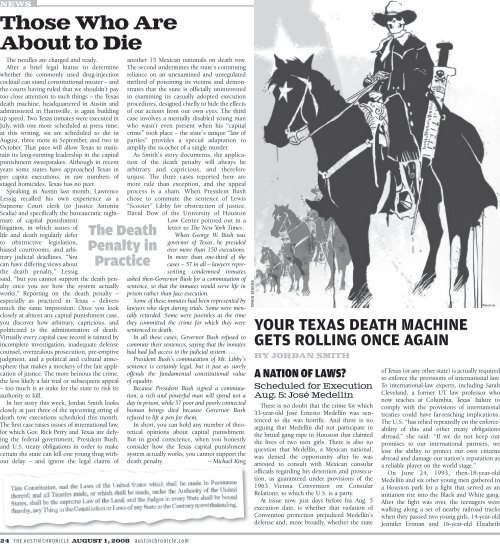Create successful ePaper yourself
Turn your PDF publications into a flip-book with our unique Google optimized e-Paper software.
NEWSThose Who AreAbout to Die<strong>The</strong> needles are charged and ready.After a brief legal hiatus to determinewhether the commonly used drug-injectioncocktail can stand constitutional muster – andthe courts having ruled that we shouldn’t paytoo close attention to such things – the Texasdeath machine, headquartered in <strong>Austin</strong> andadministered in Huntsville, is again buildingup speed. Two Texas inmates were executed inJuly, with one more scheduled at press time;at this writing, six are scheduled to die in<strong>Aug</strong>ust, three more in September, and two inOctober. That pace will allow Texas to maintainits long-running leadership in the capitalpunishment sweepstakes. Although in recentyears some states have approached Texas inper capita executions, in raw numbers ofstaged homicides, Texas has no peer.Speaking in <strong>Austin</strong> last month, LawrenceLessig recalled his own experience as aSupreme Court clerk (to Justice AntoninScalia) and specifically the bureaucratic nightmareof capital punishmentlitigation, in which issues oflife and death regularly deferto obstructive legislation,biased courtrooms, and arbitraryjudicial deadlines. “Youcan have differing views aboutthe death penalty,” Lessigsaid, “but you cannot support the death penaltyonce you see how the system actuallyworks.” Reporting on the death penalty –especially as practiced in Texas – deliversmuch the same impression: Once you lookclosely at almost any capital punishment case,you discover how arbitrary, capricious, andpoliticized is the administration of death.Virtually every capital case record is tainted byincomplete investigation, inadequate defensecounsel, overzealous prosecution, pre-emptivejudgment, and a political and cultural atmospherethat makes a mockery of the fair applicationof justice. <strong>The</strong> more heinous the crime,the less likely a fair trial or subsequent appeal– too much is at stake for the state to risk itsauthority to kill.In her story this week, Jordan Smith looksclosely at just three of the upcoming string ofdeath row executions scheduled this month.<strong>The</strong> first case raises issues of international law,for which Gov. Rick Perry and Texas are defyingthe federal government, President Bush,and U.S. treaty obligations in order to makecertain the state can kill one young thug withoutdelay – and ignore the legal claims of<strong>The</strong> DeathPenalty inPracticeanother 15 Mexican nationals on death row.<strong>The</strong> second undermines the state’s continuingreliance on an unexamined and unregulatedmethod of poisoning its victims and demonstratesthat the state is officially uninterestedin examining its casually adopted executionprocedures, designed chiefly to hide the effectsof our actions from our own eyes. <strong>The</strong> thirdcase involves a mentally disabled young manwho wasn’t even present when his “capitalcrime” took place – the state’s unique “law ofparties” provides a special adaptation toamplify the ricochet of a single murder.As Smith’s story documents, the applicationof the death penalty will always bearbitrary and capricious, and thereforeunjust. <strong>The</strong> three cases reported here aremore rule than exception, and the appealprocess is a sham. When President Bushchose to commute the sentence of Lewis“Scooter” Libby for obstruction of justice,David Dow of the University of HoustonLaw Center pointed out in aletter to <strong>The</strong> New York Times:When George W. Bush wasgovernor of Texas, he presidedover more than 150 executions.In more than one-third of thecases – 57 in all – lawyers representingcondemned inmatesasked then-Governor Bush for a commutation ofsentence, so that the inmates would serve life inprison rather than face execution.Some of these inmates had been represented bylawyers who slept during trials. Some were mentallyretarded. Some were juveniles at the timethey committed the crime for which they weresentenced to death.In all these cases, Governor Bush refused tocommute their sentences, saying that the inmateshad had full access to the judicial system. …President Bush’s commutation of Mr. Libby’ssentence is certainly legal, but it just as surelyoffends the fundamental constitutional valueof equality.Because President Bush signed a commutation,a rich and powerful man will spend not aday in prison, while 57 poor and poorly connectedhuman beings died because Governor Bushrefused to lift a pen for them.In short, you can hold any number of theoreticalopinions about capital punishment.But in good conscience, when you honestlyconsider how the Texas capital punishmentsystem actually works, you cannot support thedeath penalty.– Michael King24 T H E A U S T I N C H R O N I C L E AUGUST 1, <strong>2008</strong> a u s t i n c h r o n i c l e . c o mCRAIG STAGGSYOUR TEXAS DEATH MACHINEGETS ROLLING ONCE AGAINBY JORDAN SMITHA NATION OF LAWS?Scheduled for Execution<strong>Aug</strong>. 5: José Medellín<strong>The</strong>re is no doubt that the crime for which33-year-old José Ernesto Medellín was sentencedto die was horrific. And there is noarguing that Medellín did not participate inthe brutal gang rape in Houston that claimedthe lives of two teen girls. <strong>The</strong>re is also noquestion that Medellín, a Mexican national,was denied the opportunity after he wasarrested to consult with Mexican consularofficials regarding his detention and prosecution,as guaranteed under provisions of the1963 Vienna Convention on ConsularRelations, to which the U.S. is a party.At issue now, just days before his <strong>Aug</strong>. 5execution date, is whether that violation ofConvention protection prejudiced Medellín’sdefense and, more broadly, whether the stateof Texas (or any other state) is actually requiredto enforce the provisions of international law.To international-law experts, including SarahCleveland, a former UT law professor whonow teaches at Columbia, Texas’ failure tocomply with the provisions of internationaltreaties could have far-reaching implications.<strong>The</strong> U.S. “has relied repeatedly on the enforceabilityof this and other treaty obligationsabroad,” she said. “If we do not keep ourpromises to our international partners, welose the ability to protect our own citizensabroad and damage our nation’s reputation asa reliable player on the world stage.”On June 24, 1993, then-18-year-oldMedellín and six other young men gathered ina Houston park for a fight that served as aninitiation rite into the Black and White gang.After the fight was over, the teenagers werewalking along a set of nearby railroad trackswhen they passed two young girls, 14-year-oldJennifer Ertman and 16-year-old Elizabeth
















